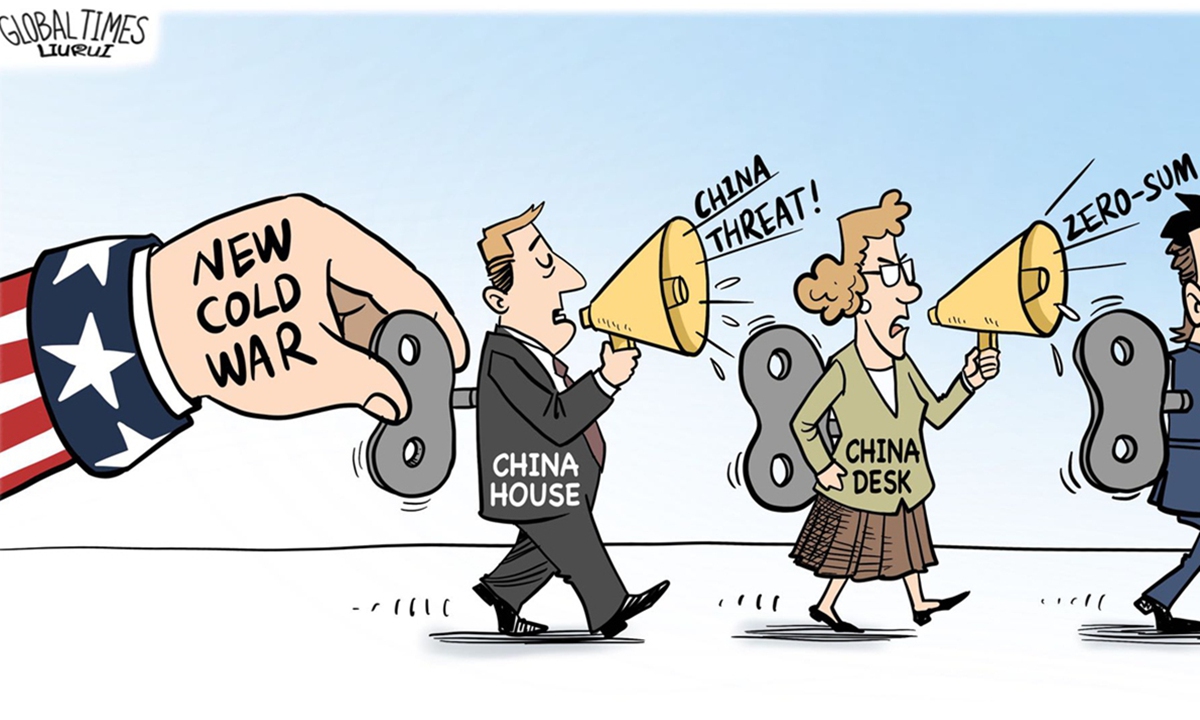
Illustration: Liu Rui/GT
As some American scholars have acknowledged, Sinophobia in the US today has reached its highest level. In fact, if someone regularly reads American newspapers, they can find a wealth of hysterical rhetoric - constantly criticizing, opposing and attacking China.
In the US, Sinophobia exhibits several characteristics. First, this fear is comprehensive, covering almost all aspects, including geopolitics, military, trade, technology and systemic issues. Second, it is a government-wide phenomenon. Third, the government's fear has spread to all corners of US society, as reflected in various opinion polls. Fourth, it has a strong tendency to spread and infect other countries.
In the economic realm, the US remains the world's largest economy. Whether in terms of market or technology, the US continues to be admired by many countries. In this realm, the US' fear stems from the fact that, despite the country having invested in suppressing China, the Chinese economy is not only surviving in an increasing number of areas and showing remarkable resilience, but also growing stronger.
The deepest layer of the US' fear regarding China lies in the realm of systems and institutions. In this regard, US Senator Marco Rubio's statements are particularly representative. This outspoken critic of China stated that "Capitalism didn't change China. China changed capitalism," leading the US to face "this historic and catastrophic mistake." President Joe Biden framed the competition between the US and China as a struggle between "democracy" and "authoritarianism," and has shown confidence that the former will win. However, American society has long lost its confidence in US democracy. This is because US democracy is facing unprecedented internal challenges, primarily due to extreme social inequality and division.
All of this fear ultimately translates into geopolitical anxiety toward China. Anything China does can be interpreted by Washington as part of its geopolitical rivalry with the US which absolutely will not tolerate any other country challenging its hegemonic position. Clearly, for China, a core issue in international relations and diplomacy for the foreseeable future is how to manage the US' Sinophobia.
First, to address the US' fear of China, we need to stay calm, closely analyze how this fear is expressed and understand its reasons before developing and taking effective countermeasures.
Second, it's crucial to present China in a positive light. We need to "tell China stories well." The goal of that is to help other countries understand and accept China. China stories are aimed not at anti-China critics but at the majority of foreign readers.
Third, in specific areas, including economics and trade, technology, and political systems, we can respond. But we should be aware that responses must be purposeful and rational rather than simple emotional reactions.
Fourth, in terms of geopolitics, China does not pursue the same ambitions as the US. Since China's major geopolitical interests are in its surrounding regions, the US concentrates on containing and encircling China in these areas. Therefore, China needs to enhance its national defense to ensure it can adequately protect itself.
To effectively respond to the US, China's cooperation should extend beyond its neighboring countries, such as the Belt and Road Initiative. While the US focuses on containment and encirclement through alliances in China's surrounding regions, China emphasizes defense and seeks breakthroughs through inclusive multilateralism. Globally, while the US prioritizes national security, China focuses on economic development, helping regional countries balance their security and development needs.
The US has framed the competition between China and itself as a clash of political systems, which is something China must confront directly. It is important to highlight that China's political system is tailored to Chinese civilization, culture and its national conditions. It is a non-Western system, not an anti-Western system. China does not aim to impose its system on other countries, but rather it hopes that every nation can find a political system that aligns with its civilization. At the same time, China also supports mutual learning and exchanges between countries, encouraging countries to share and adopt the best practices from different systems through civilizational dialogue.
The author is a professor at the Chinese University of Hong Kong, Shenzhen and president of The Institute for International Affairs, Qianhai. opinion@globaltimes.com.cn


